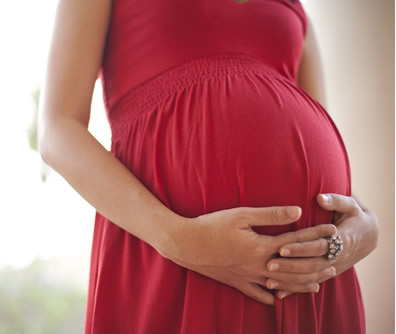
A large, long-term study among women with lupus has yielded important insights into how to predict who may develop pregnancy complications associated with the disease, and who is most likely to have a healthy pregnancy. A related study identified key factors that may put a woman at risk for problems, allowing for early detection and monitoring. Results of the studies, which were funded in part by the NIH’s National Institute of Arthritis and Musculoskeletal and Skin Diseases (NIAMS), were published in the American Journal of Obstetrics and Gynecology, and the Annals of Internal Medicine.
Systemic lupus erythematosus (SLE), or lupus, is a chronic, autoimmune disease in which the immune system mistakenly attacks its own tissues and organs, causing inflammation. In lupus, periods of remission alternate with relapses or flares. Lupus is more common in women than in men, and often strikes during childbearing years, complicating family planning. Pregnancy loss is more common in women with lupus than in women without the disease, especially when antiphospholipid antibody syndrome (APS)—a condition that frequently co-occurs with lupus—is present. APS causes clots inside the blood vessels (thrombosis).
"Women with lupus are sometimes discouraged from having children", said senior author and NIAMS grantee Jane Salmon, M.D., of the Hospital for Special Surgery and Weill Cornell Medical College. "We wanted to determine if we could accurately identify those most at risk for complications and therefore in need of more intensive monitoring."
The Predictors of Pregnancy Outcome: Biomarkers in Antiphospholipid Antibody Syndrome and Systemic Lupus Erythematosus (PROMISSE) study enrolled more than 700 pregnant women with lupus, APS or no disease from sites in both the United States and Canada. The women joined the study in their first trimester, and were followed throughout their pregnancies.
Between 2003 and 2012, a subset of the PROMISSE participants was analyzed to track pregnancy outcomes. Dr. Salmon and colleagues found that 81 percent of the pregnancies in women with lupus were free of serious complications. Five percent of the women experienced miscarriage, and 9 percent delivered prematurely. Ten percent of the babies were born with low birth weight. About 5 percent of the women developed lupus flares in the second or third trimesters.
Most of the women who experienced complications had one or more risk factors during their first trimester, including the presence of a specific type of antiphospholipid antibody, treatment for high blood pressure, and a low platelet count, which can result in blood clotting problems. In addition, pregnancy complications were more frequent in African American and Hispanic women. The researchers determined that among women who did not have any of these risk factors in the beginning of their pregnancy, the chance of developing a problem was less than 8 percent.
Another subset of the PROMISSE cohort allowed the researchers to further pinpoint—early in the pregnancy—who was most at risk for severe difficulties. The researchers measured certain angiogenic factors in 492 pregnant women with lupus and/or APS in their first trimester, and compared them to 207 matched healthy pregnant women. Angiogenic biomarkers circulate during pregnancy and influence the formation of blood vessels, the development of the placenta and the health of the mother. If these factors become unbalanced, serious problems can result. The investigators discovered that if these angiogenic biomarkers were balanced in the first trimester, and no clinical risk factors were present, there was a 95 percent chance the pregnancy would be free of adverse events.
"Being able to identify who is most at risk for pregnancy complications means we can allow many lupus patients to forgo expensive, frequent, and sometimes anxiety-producing prenatal visits to multiple doctors, especially if their disease is stable or inactive," said Dr. Salmon. "We hope these findings will help guide clinical care, as well as assure many women with mild or moderate lupus that they can pursue a pregnancy, provided the appropriate medical care is in place".
This research was funded in part by the NIAMS (grant numbers R01AR049772 and R01AR043727), the Mary Kirkland Center for Lupus Research, the Alliance for Lupus Research and Rheuminations.
# # #
Predictors of Pregnancy Outcomes in Patients with Lupus: A Cohort Study. Buyon JP, Kim MY, Guerra MM, Laskin CA, Petri M, Lockshin MD, Sammaritano LR, Branch DW, Porter TF, Sawitzke A, Merrill JT, Stephenson MD, Cohn E, Garabet L, Salmon JE. Ann Intern Med. 2015 Aug 4; 163(3):153-63. Doi: 10.7326/M14-2235. PMID: 26098843.
Angiogenic factor imbalance early in pregnancy predicts adverse outcomes in patients with lupus and antiphospholipid antibodies: results of the PROMISSE study. Kim MY, Buyon JP, Guerra MM, Rana S, Zhang D, Laskin CA, Petri M, Lockshin MD, Sammaritano LR, Branch DW, Porter TF, Merrill JT, Stephenson MD, Gao Q, Karumanchi SA, Salmon JE. Am J Obstet Gynecol. 2016 Jan; 214(1): 108.e1-108.e14. doi: 10.1016/j.ajog.2015.09.066. Epub 2015 Sep 29. PMID: 26432463.
The mission of the NIAMS, a part of the U.S. Department of Health and Human Services' National Institutes of Health, is to support research into the causes, treatment and prevention of arthritis and musculoskeletal and skin diseases; the training of basic and clinical scientists to carry out this research; and the dissemination of information on research progress in these diseases. For more information about the NIAMS, call the information clearinghouse at (301) 495-4484 or (877) 22-NIAMS (free call) or visit the NIAMS website at https://www.niams.nih.gov.
